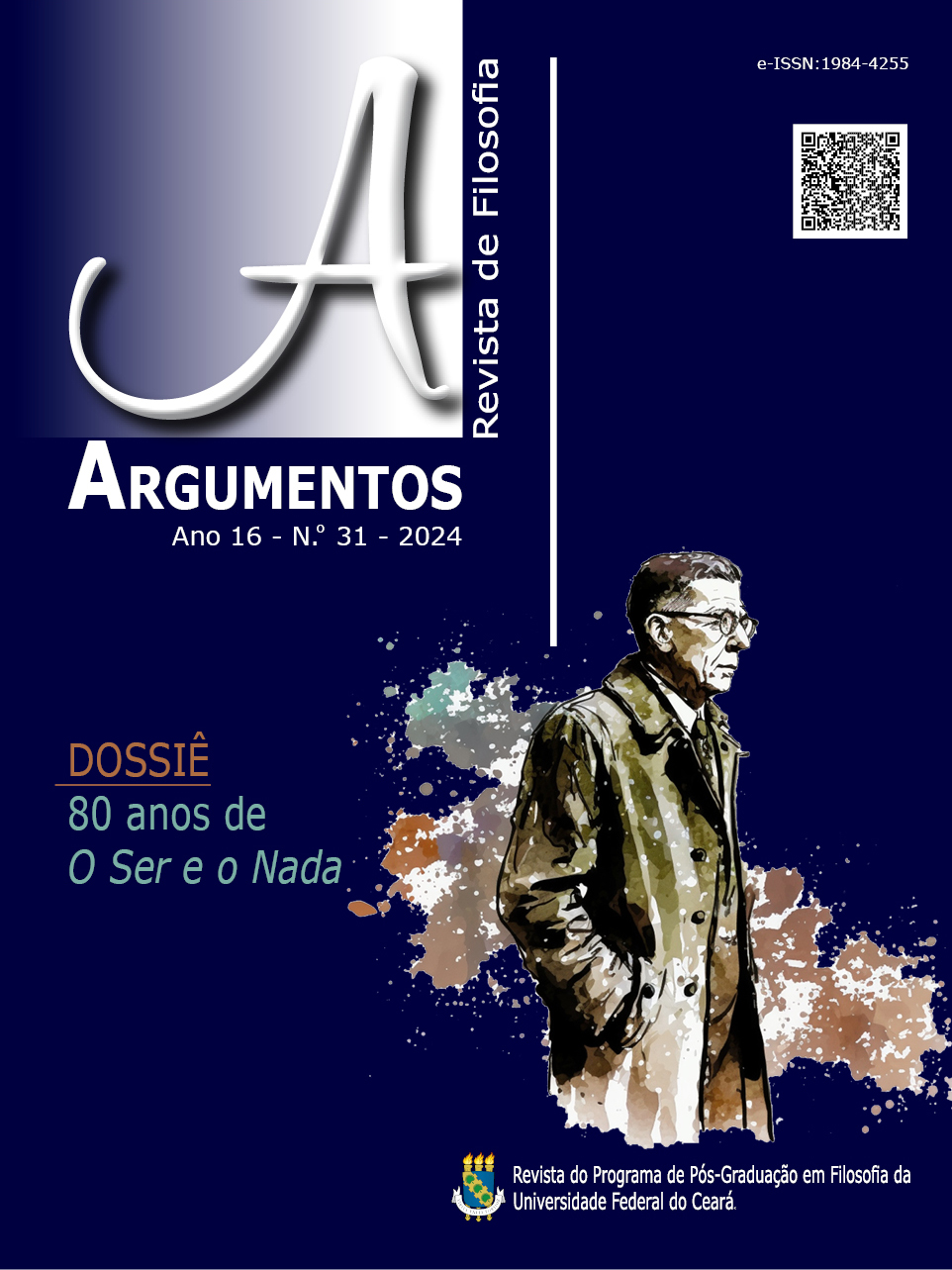The psychological experience of “We”: alienation, community and engagement in Being and Nothingness
DOI:
https://doi.org/10.36517/Argumentos.31.7Keywords:
For-others. Us-object. We-subject. Existentialism. Sartre.Abstract
The article addresses the psychological experience of the "We" developed in Being and Nothingness (BN), and how it resonates within the social dynamics of Critique of Dialectical Reason (CDR). It is problematized about which "We" is spoken in the condition of Being-with. In BN, Sartre demonstrates that the foundation of human relationships is conflict, as being-with-others is rooted in being-for-others. This, therefore, reflects on the impossibility of psychological experiences of the Us-object and We-subject to support alienation and engagement. We start from the conjuncture of serial collectivity to address the experience of the Us-object, and the necessity of individual choice for engagement with others, which may or not occur when the experience of Us-object takes place. In this way, when individuals recognize themselves as part of a structure organized by a third party and aim for a common goal, the community subject happens. We noticed that Sartre, in Being and Nothingness and its developments, helps us to think about being-with-another, even in a virtual world of the 21st century. Sartre, throughout his life and although without success, strove to materialize the Being that he idealized for people: mutually committed to the responsible construction of a socio-material field “desirable for a community”, including conflict resolutions.
References
ALVES, P. M. S. Subjetividade e intersubjetividade: Sartre perante Hegel e Husserl. Rev. abordagem gestalt., Goiânia, v. 13, n. 1, p. 97-109, jun./2007.
ANEESH, A. Global labor: Algocratic modes of organization. Sociological Theory, v. 27, n. 4, p. 347-370, 2009.
BEAUVOIR, S. de. A força das coisas. 2. ed. Tradução de Maria Helena Franco Martins. Rio de Janeiro: Nova Fronteira, 2009.
COHEN-SOLAL, A. Sartre: a life. Transleted by Anna Congogni. New York: Pantheon Books, 1987.
DANAHER, J. The threat of algocracy: reality, resistance and accommodation. Philosophy and Technology, v. 29, n. 3, p. 245-268, 2016.
GONZÁLEZ-BAILÓN, S. et. al. Asymmetric ideological segregation in exposure to political news on Facebook. Science, v. 381, n. 6656, p. 392-398, 2023.
O’NEIL, C. Algoritmos de destruição em massa: como o Big Data aumenta a desigualdade e ameaça a democracia. Tradução de Rafael Abraham. Santo André: Editora Rua do Sabão, 2020.
SARTRE, J-P. Crítica da razão dialética: precedido por Questões de método. Tradução de Guilherme João de Freitas Teixeira. Rio de Janeiro: DP&A, 2002.
SARTRE, J-P. Entre quatro paredes. 2. ed. Tradução de A. Araújo e P. Hussak. Rio de Janeiro: Civilização Brasileira, 2006.
SARTRE, J-P. Entrevista com Jean-Paul Sartre: La amistad es uma herramienta política. In:
SARTRE, J-P. Entrevistas. Tradução de Leandro Sánchez Marín. Medellín: Ennegativo Ediciones, 2019. p. 132-141.
SARTRE, J-P. L’Existentialisme est um Humanisme. Paris: Les Éditions Nagel, 1970.
SARTRE, J-P. Masas, espontaneidad, partido. In: ROSSANDA, R. et. al. Teoría marxista del partido político III. Cuadernos de Pasado Y Presente. 5. ed. México: Siglo XXI Editores, 1987. p. 15-31.
SARTRE, J-P. O ser e o nada: ensaio de ontologia fenomenológica. 20. ed. Tradução de Paulo Perdigão. Petrópolis: Editora Vozes, 2011.
SAVIGNANO, A. El problema de los otros en Jean-Paul Sartre: magia, conflicto y generosidad. Buenos Aires: SB Editorial, 2022.
Downloads
Published
Issue
Section
License
Argumentos magazine is licensed under an International Creative Commons Attribution License.
The Magazine uses CC BY inclusion
1) The authors retain the copyright granted to the magazine or the right to initial publication, with the work regularly licensed under the Creative Commons Attribution, which allows the sharing of the work with acknowledgment of authorship and initial publication in this magazine.
2) The authors are authorized to contract additional applicable contracts, for non-exclusive distribution of the version of the work published in this journal (for example, publication in the institutional repository or as a chapter of the book), recognition of authorship and initial publication in this journal.
3) Authors are authorized and encourage to publish and distribute their work online (for example, in institutional repositories or on their personal pages) at any time before or during the editorial process, as they can generate productive changes, as well as increase the impact and reference of published work.




.jpg)










._._3.png)
1.jpg)
._._._.png)
